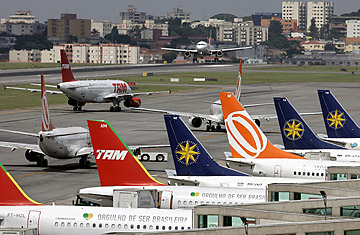
An aircraft lands at the Congonhas domestic airport in Sao Paulo, Brazil, April 2, 2007.
For months now, Brazil's air traffic control system has teetered on the brink of collapse. Lack of investment in technology, infrastructure and personnel has condemned the system to a slow demise, while poor administration and weak leadership have exacerbated problems revealed last fall after a U.S.-owned private jet clipped the underside of a Boeing 737 and sent it spiraling to the ground in the Amazon rainforest, killing 154 people. The resulting investigation exposed some of the hidden horrors of Brazil's air traffic control system: black spots in radar coverage above the Amazon, overworked and overstressed air traffic controllers with barely enough English to communicate with foreign pilots, and outdated equipment liable to fail at any time. And then there's the lack of accountability in the hermetic, military-run system. What the investigation hasn't led to are changes.
"Six months of crisis and there are no positive signs that the difficulties faced by the Air Traffic Controllers [are being resolved]," a group of controllers said in a statement Friday. "On the contrary, things have got worse."
Brazil's 2,220 controllers are forced to work long hours on poor equipment for a starting salary of around $800 a month. Last Friday, a disgruntled faction launched a hunger strike in protest. Not surprisingly, chaos ensued as flights backed up all across South America's largest nation.
Amid mounting delays and anger, President Luiz Inacio Lula da Silva quickly caved in to the controllers' demands and ordered a gradual civilian takeover of the military-run system. Military commanders, who wanted the men sacked for subordination, responded angrily to what they saw as a flouting of the hierarchy and encroachment on their control. But Lula's climb-down got the controllers back behind their radar screens on Monday, as the situation began to approach normalcy. Only 6% of flights were delayed by more than an hour, down from 19% the day before and 30% on Saturday.
But whether it stays that way is anyone's guess. Pressure from the military forced Lula to change his mind on Monday night, and military commanders have formally accused the maverick controllers of "military crimes." They, in turn, threaten to cause more chaos. Lula is stuck. He can't sack them because there is no one to replace them, and he is afraid to take on the military.
Managing the crisis might have been easier had Lula moved to resolve it when it first emerged six months ago. Back then, he assured travelers he would hire more controllers and modernize the system. Instead, all he did was block a congressional investigation into the reasons for the delays — today his Workers' Party is still battling to prevent lawmakers from opening a full enquiry.
Passengers are furious, and who can blame them? Thousands like me were forced to spend a night last week sprawled out on concourse floors or curled up on plastic seats. Some harangued airline staff. One man even died from a heart attack after spending the night on the floor in Curitiba.
But the outrage that spread across the country in December after similar delays paralyzed the nation has diminished — this time around no one invaded runways. Most Brazilians, accustomed to government inaction, appear to have accepted the chaos at airports, just as they accept chaos in so many other parts of Brazilian life. "This has to be a practical joke," one man laughingly told his friend when his flight was delayed yet again. It's not. It's a practical disaster, with no sign of practical solutions.
